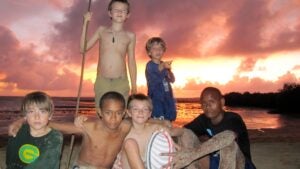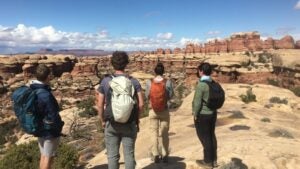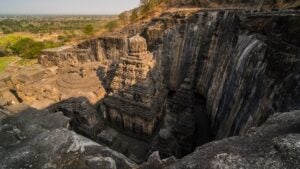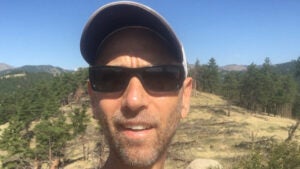Stop Overplanning Your Vacation. It’s Ruining Your Trip.
The secret to the best adventures? The element of surprise. So embrace the unexpected—it’s good for your health, too.
New perk: Easily find new routes and hidden gems, upcoming running events, and more near you. Your weekly Local Running Newsletter has everything you need to lace up! .
The central train station in Mumbai is one of the busiest railway hubs in India. Moving through it, visitors are easily pushed and pulled off course by the human tides, especially if it’s your first day in the country. So I felt victorious when I made it to the correct platform comfortably ahead of my train’s departure time.
I had arrived in Mumbai (at the time still called Bombay) early that same morning, solo, on a flight from Cairo that I had taken on a whim. The fare was cheap and India sounded exciting. That was the extent of my planning. I didn’t even have a Lonely Planet guidebook, just a map of India (this was pre-internet). I had just turned 21 and over the previous few months had discovered the joys of traveling more by feel than plan.
I didn’t need advance planning to know my first move after landing. I loved traveling, but much preferred exploring rural areas over big cities, so I didn’t waste any time getting out of Mumbai. I had a vague notion to head generally east and north, angling for the Himalayas, where I hoped eventually to go trekking. I consulted my map and bought a ticket on a train heading inland, to a town about 200 miles from the crowded west coast.
I picked up some spicy lentil mix from a snack wallah, found a patch of unclaimed cement on the platform, and sat on my pack, content to watch the swirl of families, commuters, and who-knows-why travelers.

The cavernous station afforded a good view of trains coming and going, so I saw mine rolling toward me when it was a few hundred yards away. The locomotive slowed to a jogging pace as it neared the end of the line. I’ve always enjoyed that moment just before the start of a journey by rail, when you anticipate stepping aboard but have to wait a few more seconds before the train comes to a complete stop.
Except people weren’t waiting. Men in the crowd—only men, young ones—started running toward the still-moving train and diving into the open windows. This wasn’t an easy feat; the windows were not big. I watched, mystified, as more leapers followed the first wave through the openings, as if storming a moving castle.
Men continued to climb through the windows even after the train stopped. Now I could see why. A crush of bodies jammed the doorway as passengers trying to get off the train collided with those trying to get on. Slowly, they squeezed past each other, contorting through, an arm at a time, a shoulder at a time. For the moment, at least, the best way in was through the windows.
Research on the emotion of surprise from prominent universities makes it clear that we benefit in both immediate and lasting ways when the world shakes us loose from the routine and expected—from the planned.
I sat on my pack until the frenzy subsided. By the time I boarded, the train car was a cliche of overcrowded transportation: six people crammed into every three-person seat, passengers lying prone in the luggage racks, squatters in the aisles. The only space left was a small transition zone between the doorway and the carriage, where the stragglers ended up. I squeezed in, and when the train pulled away, we were standing rock-concert tight, pressed together so densely that you couldn’t fall down if you wanted to.
My immediate neighbors didn’t seem to mind being crammed up against the sweaty foreigner who took up too much space because he couldn’t squat worth a damn. A slight, twenty-something guy laughed good-naturedly at my discomfort. He said something to his friend. I couldn’t understand it, but I was pretty sure it was something like, “This tourist must be especially dumb to end up on a second-class train.”
Which was true. For just a few more bucks I could have gone first-class express with a seat of my own. But I hadn’t learned that yet. I was navigating the Indian train system by trial and error, so here I was—traveling very slowly east, on a train stopping at every village, my knees aching because there wasn’t enough space to sit or lie down, heading for a random destination I’d plucked off the map.
I don’t recall the town’s name, and it doesn’t really matter because I never made it there. It’s where I ended up that counts.

ELSEWHERE ON THIS website, you’ll find lots of great advice about planning a life-list trip. After all, careful planning can save you time, maybe money, and most importantly will result in exactly the kind of experience most travelers want—the one they’ve been dreaming of. The one they expect. Call it the gospel of travel planning. And I think it’s wrong. The best journey is the one we can’t imagine.
Science agrees. Research from prominent universities on the emotion of surprise makes it clear that we benefit in both immediate and lasting ways when the world shakes us loose from the routine and expected—from the planned. You may not realize it, but your brain likes to be surprised.
Neuroscientists have discovered that unexpected events trigger the nucleus accumbens, the brain’s pleasure center. You’ve experienced the effect if you’ve ever received a surprise gift of flowers, or a box of chocolates, or a raise out of the blue. You would have enjoyed those things if you knew they were coming, but unpredictability increases the pleasure. That’s because you get a shot of feel-good dopamine, according to a by researchers at Emory University School of Medicine and Baylor College of Medicine that analyzed the brain’s response to predictable and unpredictable rewards. Subsequent research has shown that surprises also generate a dose of noradrenaline, which aids focus and attention.
Boosting pleasure and focus is reward enough, but it gets better. Current from MIT scientists, published in 2022 in Nature, suggests that the element of surprise improves memory, which bolsters one of the great rewards of travel: remembering our bucket-list experiences long after enjoying them. You don’t need a neuroscientist to tell you why that’s important. The benefits of being surprised read like a tick list of what I value most about traveling: discover unexpected rewards, learn something new, and remember everything well in the years to come.
In the definitive book on the subject——Tania Luna and LeeAnn Renninger extol the many benefits of unpredictability, arguing that it improves happiness, relationships, work, mental health, and more. “We feel most comfortable when things are certain, but we feel most alive when they’re not,” writes Renninger.
Even if you accept this as true, it’s not easy to embrace radical surprise. Most people prefer a lesser variety, the kind you get from exploring a new trail or striking up a conversation with a stranger. But I’m after bigger game. If a little bit of surprise is good, then a lot of surprise must be great. And a lot is what you get when you travel with zero planning. A whole lot.
Naysayers will complain that zero-planning travel only works when you’re young, with few responsibilities and plenty of time for miscues.
SEVERAL HOURS INTO my inaugural Indian train ride, my legs were cramping, the sweat-box air was barely circulating, and the mosh-pit remained just as crowded. During its frequent stops, the train seemed to acquire a new passenger for every one who got off. At 3 a.m., 12 hours after boarding, I reached my limit. I decided to disembark at the next station, no matter where it was.
That’s how I ended my first day in India: stumbling off the train in the predawn darkness, finding the station’s cool, spacious concrete floor all but deserted, and lying down to sleep right there. Unexpected? Yes. But also uncomfortable. Perhaps the only thing that’s not surprising about anti-planning travel is that, occasionally, it requires some tolerance for discomfort.
I woke up when the floor started vibrating with the footsteps of morning travelers. I wandered out of the station, thinking that I might try another form of locomotion. I bought chai at a stall in the street, and the shop owner asked if I was going to visit the nearby temple. “Most famous,” he said. “You must go.”
I consulted my map and saw that, indeed, I had disembarked just 20-odd miles from a site called the Ellora Caves. The shop owner pointed to an open-bed pickup truck—basically a rideshare for laborers—and helped me secure a spot. An hour later I was at the entrance of a Unesco World Heritage Site.

The , a temple and monastery complex built between 600 and 1,000 CE, are cut from solid rock. With 34 caves spread over a mile and a half, the place is a massive piece of live-and-pray artwork, encompassing intricate decorative carvings, high-ceilinged sanctuaries, and living quarters for the monks. Every structure is carved from cathedral-size blocks of stone. The feat of construction spanned generations, with relics from three faiths—Buddhism, Hinduism, and Jainism—commingled in one site.
I had never seen anything like these rock-cut temples. Even after hours of walking around them, I was struck by the site’s size and complexity. It was like watching a slow-motion meteor shower—a thrill every time I looked up. Imagine coming upon the cliff dwellings in New Mexico’s Chaco Canyon without knowing they existed. I was in awe, a kind of surprise that lands like a time-stopping, visceral wow.
Studies have shown that awe has its own neurological rewards. Dacher Keltner, a psychologist at U.C. Berkeley, has demonstrated that the feeling of awe leads to greater well-being by boosting a host of desirable traits, like humility, curiosity, and happiness. It’s even good for your health. has linked awe with lower levels of interleukin-6, a chemical that promotes inflammation.
Would I have been awed by the Ellora Caves if I had planned a tour and researched them before visiting? Certainly. They are amazing. But add the element of surprise and the effect is exponentially more intense.
HERE’S AN OBJECTION I sometimes hear: what if a lack of planning leaves you unaware of some cultural site or geographic wonder? I could have easily missed the Ellora Caves altogether, of course. Then again, the temple complex is in a remote area, and advance planning might have steered me away, to more famous, more conveniently located sites. Regardless, I’ve found that locals everywhere love to show off their favorite places, and any curious traveler will be rewarded with both well-known and unknown experiences if they engage in conversation.
Plus, there’s the matter of unintended familiarity. While it’s satisfying to visit bucket-list places, you’ve already by definition heard of them. Consider the Taj Mahal. You don’t need a guidebook to know about the famed mausoleum. Most travelers who can reasonably fit a visit into their journey do. I did. And it did not disappoint—it’s a marvel to behold—but neither did it offer a surprise. My sharpest and fondest memory of that visit is from a moment after visiting the Taj Mahal, when I took the wheel of a bicycle rickshaw (pedaling one is way harder than it looks), and experienced something novel to both me and all the passing rickshaw drivers who witnessed me white-knuckling it along the side of the road, the owner of the rig lounging in the rear and waving at them like the queen.
When it comes to experiencing maximum wonder, surprise is the secret sauce.
SO WHAT’S THE catch? Not all surprises are good. Memorable, yes. But not always enjoyable, comfortable, or even safe. When you abandon planning, you open the door to the unexpected, and its cousin “unfortunate” might just slip through as well. That grueling train ride wasn’t my worst snafu. On a different unplanned trip, in the Solomon Islands, I ended up in a stranger’s boat on a long open-water crossing. The dinghy’s outboard motor ran out of gas just as a storm unleashed a maelstrom of rain and wind and waves, and we had to paddle for our lives with a couple wood planks. It was not the kind of surprise I was looking for.
Is it irresponsible to travel this way with young kids? All I can say is that we had no unwelcome surprises when we joined another family on a decide-on-the-fly journey through Fiji.
But the point is, radical anti-planning doesn’t come with guardrails. If the thought of waking up in the morning without knowing where you’ll be in the evening gives you hives, the approach might not be for you. But if that sounds a little bit exciting, it’s because it is.
Naysayers will complain that zero-planning travel only works when you’re young, with few responsibilities and plenty of time for miscues. It’s true I did a lot of unplanned travel in my early 20s, roaming for months on end. But if my experience stopped there, I wouldn’t be such an evangelist. As I got older and my trips got shorter—job, marriage, kids—I still made sure to travel without a plan on occasion. It can be a challenge on a standard-issue week-long vacation when you don’t want to “waste” a single day, but I’ve learned it’s the only way to invite real surprise.
Once, on a short trip through Europe, before we were married, my wife and I left Barcelona on a train heading west. We had Eurail passes and no plan (not her travel style, but she humors me). When the conductor checked our tickets, he asked where we were going and we said we didn’t know. He was perplexed and determined that we needed a destination for his stamp of approval. “Where should we go?” I asked.
Now he was truly flummoxed, so he enlisted the whole carriage, and after a flurry of conversation in Spanish, the consensus was Miravet, a small village on the Ebro River. Only one problem: the train didn’t actually stop there. No matter, a middle-aged woman offered a ride in her car, which was parked at the nearest station. That led to three days in a town with no hotels and one cafe. Vineyards surrounded the village, and a castle-fortress, originally built by the Moors, overlooked it. We found a room in a sprawling hacienda that had served as a hospital during the Spanish Civil War. I’d never heard of Miravet before, but we couldn’t have found a better place with all the planning in the world.
Is it irresponsible to travel this way with young kids? All I can say is that we had no unwelcome surprises when we joined another family on a decide-on-the-fly journey through Fiji. Between us we had five kids ages 5 to 12. On a night that I can still remember like it was yesterday, we swung from mild parental panic—where are we going to stay?—to pure joy when we found a remote lodge where a group of twentysomethings invited us to join them for an evening of kava (adults only) and singing. The unexpected a capella show was better than any Broadway musical, as far as I’m concerned.
That’s not to say I never plan vacations. I’ve enjoyed a flawless Costa Rica beach getaway at a carefully chosen spot, a Baja sea-kayaking trip that’s only possible when you plan logistics well ahead, and other such journeys. I appreciated each of those experiences. But they haven’t diminished my love for unplanned adventure.
Just this year, in fact, I went on a spring-break vacation with my college-age son and three of his friends. We headed to Utah with a single goal: hike in five national parks in five days. Otherwise we had nothing planned—no campsite reservations, no trails picked out, no pre-mapped itinerary. It was a risky way to travel during prime time in southern Utah. But we could count on plenty of surprises, and they would bring their own reward.

was the longtime editor in chief ofBackpackermagazine and has traveled extensively, from the South Pacific to the Scottish Highlands. He’s now the Director of Custom Content at �����ԹϺ��� Interactive. His next trip? In November he’s leading a group doing where his family’s tradition in unplanned travel continues. His 18-year-old son is joining him in Nepal, but he’s going with a one-way ticket. Surprises are guaranteed.


